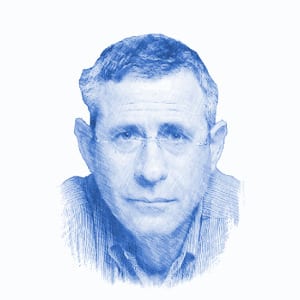Anyone following Turkish media cannot help seeing the long lines of military transport vehicles – tanks, artillery, troop carriers and auxiliary vehicles – making their way south towards the Turkish-Syrian border. The Turks have no plans to attack Syria – their objective is to nip in the bud Syrian Kurd aspirations to establish an autonomous entity south of the border, the region in which the Kurds reside.
This is not the first time Turkey has invaded the region northeast of Aleppo, Syria. Two years ago, Turkey conquered the border city of Jarablus in order to break the westward contiguity the Kurds had attempted to create in order to have direct access to the Mediterranean Sea.
Now Turkey threatens to conquer the city of Manbej, south of Jarablus and northeast of Aleppo, in order to consolidate its control over the Kurdish region and destroy any hopes of permanence for Kurdish autonomy born in the shadow of the chaotic period that began to envelop Syria in March 2011. Turkey’s designs against Syria received a shot in the arm two weeks ago from US President Donald Trump, who handed Erdogan an open check to do whatever he wishes to do in Syria.
It would be foolish to underestimate Erdogan’s intentions. He hates the Kurds with a passion, both those living in Turkey and those in neighboring countries. The Kurds comprise between a fifth and a quarter of Turkey’s population, and that fraction is constantly increasing because the Kurds have a higher birthrate than the Turks and because Turks have a inordinate tendency to emigrate to foreign lands.
Almost every city in Turkey has one or more Kurdish neighborhoods, filled with citizens, who despite their infighting, are a demographic and security threat to the Turks. The government defines the Kurdish Workers Party as a terrorist organization to all intents and purposes, and is fighting a war to the death against it. Over forty thousand civilians, both Turks and Kurds, have been killed in the struggle between the government and the Kurdish rebels who are Turkish citizens – with no end in sight.
Most of the Kurds live in one region, Kurdistan, divided, at the end of WWI among four countries – Turkey, Syria, Iraq and Iran. The Kurds in Turkey, like their brothers in Syria, Iraq and Iran, have two basic problems that prevent their gaining independence. One is that they live in an enclave with no access to the sea, allowing the countries that surround them to place them under siege and hold them in a political and economic vise. The second is their own internal disputes, preventing them from reaching a decision which a large majority will accept.
The internal conflicts came to the fore in September 2017, when Massoud Barazani, the Iraqi Kurdish leader, held a referendum among the Kurds over whether or not to separate from Iraq. Most of those who voted in the referendum voted to separate, but another part of the Kurdish nation, led by Jelal Talabani, did not take part in the vote due to opposition to the referendum and its results. The ensuing siege by the four states surrounding the Kurdish enclave convinced Barazani to give up on the idea of separating from Iraq and establishing an independent state.
The Syrian situation is similar to the Iraqi one, except for the referendum. The civil war and general paralysis Syria suffered from the latter part of 2011 onward, made the Kurds feel secure enough to establish an autonomous enclave, ignoring Turkish anger at the move. They fought ISIS and became the darlings of the West. As time went on, however, and especially after ISIS lost much of the territory it had overrun, the Kurdish forces lost their importance in the eyes of Western decision makers. The fact that they spilled rivers of blood in the war against ISIS is given short shrift today, and the world takes Erdogan into account much more than it does the Kurds.
The Kurds feeling of betrayal increased as a result of Trump’s decision to remove US forces from Syria and hand Erdogan the country on a silver platter, allowing, in Trump’s words, for Erdogan to deal with the terrorists left in Syria. The problem is that when Trump hears the word “terrorist” he hears ISIS, while Erdogan hears “Kurds.” The Kurds, fearing Turkish brutality, turned to Assad begging him to save them from the Turkish army.
Do you get it? Assad, the mass murderer par excellence, is less terrible than Erdogan – in Kurdish eyes. And Assad welcomed them, even though he knows very well that they do not really want to be his wards.
The Kurds of Syria, however, know that Assad won a colossal victory against all odds. The Russians, Iranians, Hezbollah and other Shiite militias did the dirty work for him, and as a result of this “victory,” Arab and European states are on line waiting to renew their relations with Syria and re-open their embassies in Damascus.
The reasons for this are twofold, the less important one being the desire to counter Iranian influence and convince Assad that he is better off returning to his former role as part of the Arab people rather than joining the Iranian coalition. More importantly, the sad state of Arab economies leads to their desire to invest in rebuilding Syria in order to send unemployed workers there and garner economic gain from the operating rights to be awarded the states that invest in rebuilding Syria’s infrastructure.
Economic considerations, however, do not tell the entire story. Egypt, the United Emirates and Bahrain – Saudi Arabia’s allies in the anti-Iran coalition – suggested sending forces to help Assad deal with the situation. Arab hatred of Turkey is so extreme that the last thing the Arab states wish to see is the return of the Ottoman Empire, one hundred and one years after its defeat at the hands of Europe and humiliating ejection from the Arab lands.
The Arabs have never forgotten the Ottoman Turks’ methods of maintaining their rule, how the Turkish police whipped the soles of their victims’ feet, hanged them to die on scaffolds, hoisted them on sharp petards to mangle their insides before they died. The Syrians and Iraqis have not forgotten how in the 80s, only about 30 years ago, the Turks diverted the waters of the Euphrates River to build the Attaturk Dam, leaving millions of Syrian and Iraqi farmers standing helplessly watching their crops wither in the fields while all their labors became as naught.
Arabs neither forget nor forgive. As I have said before, the old Bedouin tale of a man avenging his father’s death 40 years posthumously and saying “I hurried” is applicable everywhere in the Arab world..
Erdogan has not only Arab hatred to take into account, but also the animosity of the Turkish Kurds who are not going to sit idly by for long watching him attack their Syrian Kurdish brothers. He worries, and rightly so, that massive operations against the Kurds of Syria and Iraq are liable to bring the Turkish Kurds out to the streets to demonstrate at the very least, but possibly also to sow destruction and carry out terror attacks in the worst case. If that happens, he will be forced to break up the demonstrations by using force and find himself facing funerals which can turn into bloody and violent protests within minutes.
The Turkish economy is in bad shape, with a decline in the value of the country’s currency, surging unemployment and rampant corruption in every level of government. This, too, may influence the Kurdish public which suffers more than the average Turk because they are kept on the sidelines of economic, social and political arenas. Erdogan continues to enjoy popular public support, but there is a limit to what the Kurds are willing to undergo. A crushing operation against their brethren in Syria may be the straw that breaks the camel’s back.
Erdogan is also afraid of the Europeans, because if his attacks on the Kurds lead to negative headlines in European newspapers, European tourists may avoid Turkey and travel to Greece or other middle eastern countries such as Israel for their vacations. Industrialists may move their factories out of Turkey if they realize that labels stating “made in Turkey” is a good way to ensure their goods remain on the shelves.
In sum, one can say that the Kurds in Syria are endangered by Turkey, but not on the level spokespersons are trying to make the public believe, because they have a way out. Political savvy and a realistic approach concerning the balance of power in the region, would make it possible for the Kurds to live as Assad’s subjects. Although this solution is far from ideal, in their view, it is quite possible that an alternate one might be worse, much worse, than the orderly life – limited and humiliating as it is – achieved by allying with Assad, the victor.
Reprinted with author’s permission from Israel National News




